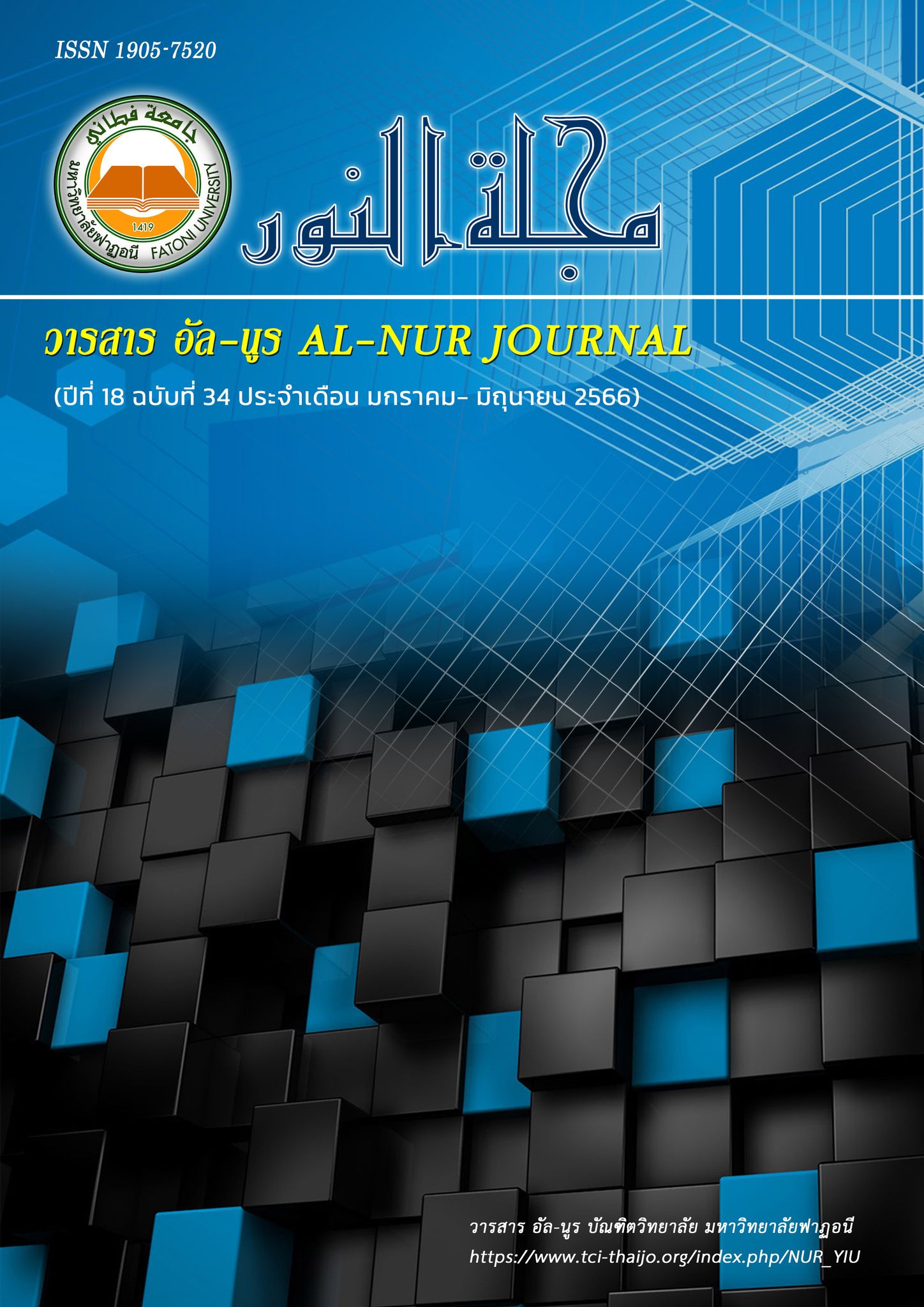การพัฒนาทักษะการพูดภาษาอาหรับโดยใช้กิจกรรมบทบาทสมมติ: กรณีศึกษานักเรียนโรงเรียนอัล-กุรอานและภาษากาลามุลลอฮฺ อำเภอยะหริ่ง จังหวัดปัตตานี
คำสำคัญ:
กิจกรรมบทบาทสมมติ; การพัฒนาทักษะการพูด; ภาษาอาหรับ; ความพึงพอใจบทคัดย่อ
บทคัดย่อ
การวิจัยครั้งนี้มีวัตถุประสงค์หลักเพื่อศึกษาผลการสอนโดยใช้กิจกรรมบทบาทสมมติและความพึงพอใจของผู้เรียนที่มีต่อการเรียนภาษาอาหรับโดยใช้กิจกรรมบทบาทสมมติ กลุ่มตัวอย่าง คือ นักเรียนมัธยมศึกษาชั้นปีที่ 2 ภาคเรียนที่ 1 ปีการศึกษา 2565 โรงเรียนอัล-กุรอานและภาษากาลามุลลอฮฺ อำเภอยะหริ่ง จังหวัดปัตตานี จำนวน 25 คน โดยวิธีการสุ่มกลุ่มตัวอย่างแบบเจาะจง เครื่องมือที่ใช้ในการวิจัยและเก็บรวบรวมข้อมูล คือ ชุดฝึกกิจกรรมบทบาทสมมติเพื่อพัฒนาทักษะการพูดภาษาอาหรับ จำนวน 3 สถานการณ์ แบบทดสอบวัดทักษะการพูดภาษาอาหรับก่อนและหลังทำกิจกรรมบทบาทสมมติ แบบประเมินความพึงพอใจที่มีต่อการจัดการเรียนรู้โดยใช้กิจกรรมบทบาทสมมติ สถิติที่ใช้วิเคราะห์ข้อมูล คือ ค่าเฉลี่ย ( ) ค่าเบี่ยงเบนมาตรฐาน (S.D.) และสถิติ t-test dependent ผลการวิจัยพบว่า ทักษะการพูดภาษาอาหรับด้วยกิจกรรมบทบาทสมมติของผู้เรียนหลังเรียนสูงกว่าก่อนเรียนอย่างมีนัยสำคัญทางสถิติที่ระดับ .05 และผู้เรียนมีความพึงพอใจต่อการเรียนภาษาอาหรับโดยใช้กิจกรรมบทบาทสมมติโดยภาพรวมอยู่ในระดับมาก โดยมีค่าเฉลี่ยรวม ( ) เท่ากับ 3.62
เอกสารอ้างอิง
กระทรวงศึกษาธิการ. (2546). พระราชบัญญัติการศึกษาแห่งชาติพุทธศักราช 2542 แก้ไขเพิ่มเติม (ฉบับที่ 2) พุทธศักราช 2545. กรุงเทพฯ: สำนักงานคณะกรรมการกฤษฎีกา.
สมาคมนักเรียนเก่าอาหรับ ประเทศไทย. (2542). อัลกุรอานฉบับแปลความหมายภาษาไทย. มาดีนะฮฺ: ศูนย์กษัตริย์ฟาฮัด เพื่อการพิมพ์อัลกุรอาน.
ดวงหทัย เรืองนนท์. (2560). การพัฒนาความสามารถด้านการพูด โดยใช้การสอนแบบแสดงบทบาทสมมติในรายวิชาภาษาไทยเพื่ออาชีพ สาขางานธุรกิจค้าปลีกร้านสะดวกซื้อระดับประกาศนียบัตรวิชาชีพครูชั้นปีที่1. (วิทยานิพนธ์ปริญญามหาบัณฑิต). มหาวิทยาลัยเกษตรศาสตร์. กรุงเทพฯ.
อัซมัต ลูโบะเด็ง. (2559). สภาพปัญหาการเรียนการสอนวิชาภาษาอาหรับในศูนย์การศึกษาอิสลามประจำมัสยิด(ตาดีกา) อำเภอจะแนะ จังหวัดนราธิวาส. (วิทยานิพนธ์ปริญญามหาบัณฑิต). มหาวิทยาลัยสงขลานครินทร์ วิทยาเขตปัตตานี, ปัตตานี.
Ladousse, G. (1998). Role Play. Oxford: Oxford University Press.
Likert, R. (1932). A technique for the measurement of attitudes. Archives of psychology.
Ments, M. (1986). The Effective Use of Role Play: Practical Techniques for improving Learning. London: Kogan page.
Moontadee, S., Kunyut, T., & Wora-in, C. (2016). Developing English speaking skills of Grade 11 students through role play activities. Humanities and Social Sciences Journal of Graduate School, Pibulsongkram Rajabhat University. 10(1), 68-83. (in Thai)
Sungpanich, P. (2017). Improving French speaking skills through the use of simulation technique of Tourism Industry students: Faculty of Management science at Chandrakasem Rajabhat University. The Bulletin de l’ATPF.
Tatip, S.,& Tanunchaibutra, P. (2016). “The development of 9 students’ Korean language listening and speaking abilities using B-SLIM Learning model together with role playing activities.” Journal of Education Khon kaen University (Graduate Studies Research). 10 (Special Issue), 135-140. (in Thai)
Tipmontree, S.,&Tasanameelarp, A. (2019). Using role playing activities to improve Thai EFL Students’ oral English communication skills. International Journal of Basiness and Society (IJBS). 21(3), 1215-1225.
المحاسبي، الحارث بن أسد. (2007). الفوائد المشوق إلى علوم القرآن وعلم البيان. بيروت: دار الكتب العلمية.
ดาวน์โหลด
เผยแพร่แล้ว
ฉบับ
ประเภทบทความ
สัญญาอนุญาต
ลิขสิทธิ์ (c) 2023 Nadiyah Yusoa

อนุญาตภายใต้เงื่อนไข Creative Commons Attribution-NonCommercial-NoDerivatives 4.0 International License.
Proposed Creative Commons Copyright Notices


